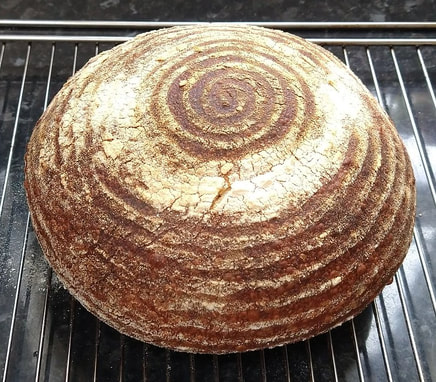This is a simple, direct, and unconditional request that we make of God every time we pray this prayer. “Daily bread” is a lovely phrase. There is something very powerful about focusing on what we need now.
If you are anything like me, this can be a challenge. Tomorrow is like a magnet for our hopes and our worries. For me, I admit, it’s more about the worries. Today might be fine, but what risks does tomorrow hold? What processes are going on right now that will create problems later?
Home ownership, I’ve learned, has opened vast new opportunities for worrying about tomorrow. But it can be anything: finances, family, the future of our job or our industry, the future of our community or our society or the world, the ongoing loss of participation in religious communities. And worry can be a rational response to an uncertain future.
So if we are fortunate enough to have today’s needs met, and to have no worry about where our next meal is coming from, it’s tempting to think ahead. We need to think ahead, to some extent, if that option is open to us.
But when we pray, we pray for today’s needs. Give us this day our daily bread. Bread for today. Not bread for tomorrow, not a stable bread supply chain, not a bread annuity for life, but today’s bread.
Now it bears mentioning that for many people today, and for most people in human history, today’s bread is the big challenge and the big worry. “How will I feed myself or my children today?” is a terrible worry to have. It makes planning impossible. People who do not have a roof over their head or secure access to food, people displaced by loss of affordable housing or made refugees by war or natural disaster are all living in today’s need.
And so it’s very important that Jesus directs everyone’s attention to the needs of today. There are two time scales that matter in the preaching of Jesus: right now and eternity. The long term is not important to him. “Which of you by worrying can add a day to his or her life?” he asks, rhetorically. “Consider the lilies of the field, which do not toil or spin. But even Solomon himself is not arrayed in glory like theirs.”
This is the context for Jesus’s instruction to pray this way. Pray deeply into now; do not let your prayers be colonized by tomorrow’s worries.
For my part, I cannot say this prayer enough. God, give me today’s needs. Today’s work. Today’s blessings. Let me not be tempted to imagine I have control over tomorrow.
And it reminds me that I have the means to be the answer to this prayer for those who truly do worry about today’s needs. What we do not need today we are free to give to those who lack.
So we hear in these words to pray for now, today, what we need in this moment. But what do we mean by “bread”? Assuming, of course, that this is not to be understood strictly literally as a daily ration of carbohydrate-rich yeast and wheat loaves.
Here I love the answer Martin Luther gives in his Small Catechism (this is on page 1164 of your red hymnals if you want to read it yourself):
What then does daily bread mean? Everything included in the necessities and nourishment for our bodies, such as food, drink, clothing, shoes, house, farm, fields, livestock, money, property, an upright spouse, upright children, upright members of the household, upright and faithful rulers, good government, good weather, peace, health, decency, honor, good friends, faithful neighbors, and the like.
It’s a great list. And the idea is that “daily bread” includes not just what we need to exist, to survive. It includes the things we need for a good human life. Not luxuries, not excess, but the things we need to experience our full humanity--including the love of friends and family and neighbors, the dignity of good government, the blessing of good health.
So here is our prayer: Give us this day our daily bread. Help us to not worry about tomorrow. Help us to receive and to share today’s bread as a gift from you. And give us what we need, right now in this moment, to be fully human. Amen.


 RSS Feed
RSS Feed